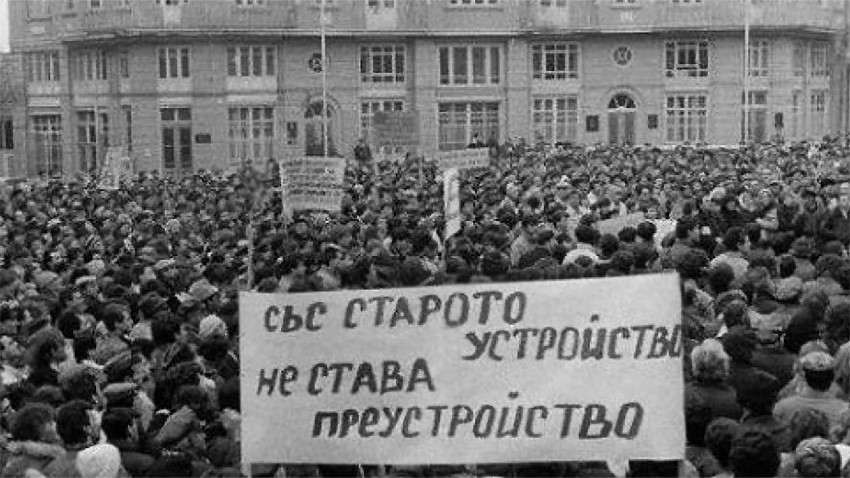“Those who cannot learn from history are doomed to repeat it”. These words sound like a cliché to many of us, but the return to the 1990’s is quite useful on the eve of the upcoming Parliamentary elections when Bulgarians are to decide to whom they will entrust the government of their country in the next 4 years. In order to be able to understand and accept the choices the Bulgarians made on all previous elections, we should take into account the change many of the current voters experienced in the late autumn of 1989. It left an indelible mark on their views and hopes:
“Most people say that in the beginning they were not prepared at all, but they wanted to see some changes, because they lived the same life for 45 years, which is not a short time at all – said Alexandar Kolarov, author of the blog “Transition Stories”. The people who had big expectations were disappointed. Those who had no expectations were disappointed as well. However, people continue to be divided on whether life was better before 1989, or not. It is impossible to reach a consensus on this issue and I am not aiming at such. I try to present different points of view, regardless of what people think is better for the country and their geopolitical preferences.”

Alexandar Kolarov described himself as “a child of the transition period”. He talked to dozens of ordinary people, as well as to doctors, lawyers, politicians and public figures, in order to find an answer to the question in which direction this country is going. And he always asks the question: “Why things are not happening the right way?”. The most common answer of the politicians is that those who were in the government before them did the same. This answer dissuades many people in Bulgaria from being the catalyst of the changes they want to see in their country. Still, in his words, people are able to make informed choice, because they are smart. However, the politicians also have their part to play in this process:
“They need to stop telling people what may happen and must say exactly what they will do for their district. My generation does not believe in promises. We are part of a consumer society that wants the things to happen immediately, not in 10, 15 or 20 years. They must come up with concrete solutions for the next 4 years, if they want to encourage the young people to get involved in this process. ”
In Alexandar’s view, the good news is that after the protests of the summer of 2020, a critical mass of people began to be interested in what is happening in Bulgaria. He contends that this must continue until, or even after the general elections, albeit with other forms of control, which do not necessarily include protests. Asking the question “why did this happen” is a smart way of holding the government accountable for its acts or omissions, said Alexandar.
English version: Kostadin Atanasov
Photos: private library
The 33rd Bulgarian polar expedition is heading to Antarctica to continue its scientific research in cooperation with scientists from different countries. For the first time, travelers from two Balkan countries - Greece and Montenegro, as well as from..
The program of the Orthodox Book Week offers meetings with authors, publishers and translators of Orthodox books from the last few years. The event is held until November 10 at the ''St. Procopius of Varna'' Church, with meetings taking place every..
The "Kabiyuk" horse breeding farm in the village of Konyovets is the oldest stud farm in Bulgaria, founded in 1864 by Midhat Pasha, the governor of the vilayet of Ruse, to produce horses for the Turkish army. The farm existed until the Russo-Turkish War..
For the 30th consecutive year, the Bulgarian Posts organize a contest for the most beautiful letter to Santa Claus. Letters must be sent by 18..

+359 2 9336 661
